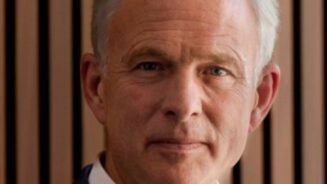This is despite the fact that his fund routinely out performs his benchmark, the TOPIX index.
“I’ve always thought that all of the Japanese prime ministers that I’d seen in office were ineffectual,” he told a visitor to the company’s Mayfair, London offices the other week.
Coupland Cardiff, or CCAM for short, is an Asia-focussed, London-based fund boutique founded by Angus Coupland and Richard Cardiff in 2005.
It currently manages five specialist funds, of which Dobson’s Dublin-domiciled CC Japan Alpha
Fund is one.
“The politicians could not to be relied upon to deliver much-needed change; most Japanese companies continued to be run to ensure maximum employment and lifetime careers for those who desired one, rather than for their shareholders.
“And whenever the Bank of Japan decided to make a move, it did so, as the standing joke in international circles always went, at a pace somewhere between that of a snail and a glacier.”
Additional problems – such as the country’s persistently low birth rate and its consequently shrinking and ageing population, and the fact that its main stock market index bears little resemblance to the country’s actual economic composition – have also long complicated investors’ attempts to make a profit, Dobson points out.
What’s more, this has been the case pretty much since anyone can remember, in spite of Japan being, even now, the world’s fourth largest economy, (having slipped from third place earlier this year with the rise of
India).
However, Dobson says, he changed his view “totally” from that of a “long-term Japan cynic” in March of last year.
“What made me sit up and take notice, and change my view on Japan by 180 degrees, was when the Bank of Japan (BoJ) came out with a very aggressive statement last March, saying that it was going to double the monetary base in two years, and that it would use everything in its power to throw money at asset purchases, and otherwise introduce a turbo-charged programme of quantitative easing.”
To put this statement in perspective, Dobson points out, it’s worth remembering “that it took the [US
Federal Reserve] four years after the Lehman Brothers crisis to double the monetary base in the US…
“Here, you have the BoJ committing to do the same thing, in half the time.”
‘Dramatic’ results
As might be expected of such a major policy initiative, the results thus far have been dramatic, even if the full 2% inflationary target that the QE was intended to spark off thus far, at least, has not been met.
As expected, the stimulus weakened the yen, giving Japan’s exporters a boost, which in turn saw the country’s TOPIX stock index – heavily weighted with manufacturing businesses, including Canon, Panasonic, Nintendo and Toyota – reach levels in September that it had not previously seen since 2008.
“Right now, if you were to look at an economic checklist for the Japanese economy, you’d see large green ticks next to almost all the boxes, from ‘employment levels’ and ‘wage levels’ to ‘luxury goods purchases’ and ‘real estate sales’,” Dobson says.
“Economically, Japan is at a point that I’ve never seen before in my 20 years of being an investor there.”
In the year to the end of August 2014, Dobson’s fund generated a return to investors of 17.71%, compared to a gain on the TOPIX during the same period of 17.84%, as measured in yen.
Over five years, again to the end of August, the fund was up 57.92%, compared with a 34.97% rise in the TOPIX.
For Dobson, one quickly discovers, Japan is more than a country he happens to know a lot about because his day job requires him to. For one thing, he’s sufficiently fluent in the Japanese language that he uses it when conducting routine interviews with the executives who run the companies he invests in.
Deep knowledge
His explanations for his investment process, meanwhile, reflect his consciousness of hidden forces that weigh on Japanese companies and industries, such as cross-ownership structures that have helped to keep alive numerous major Japanese manufacturers that otherwise would have gone bust.
Social attitudes that traditionally have valued jobs for life above shareholder returns also routinely come into play.
Dobson summarises his investment style as “index agnostic”, a philosophy he says is fuelled by his cynicism about Japan’s long-term problems (which he points out have “not gone away” even though the economy is in better shape).
This means that he ignores the TOPIX when deciding which companies to invest in, an agnosticism he says is justified by the fact that “the structure of the stock market bears no resemblance to economic reality”, and with its disproportionate emphasis on long-established, brand-name manufacturers that he argues “have very little genuine economic value”.
Consequently Dobson shuns, say, the shares of traditional department store retailers like Takashimaya, which have seen their sales plunge steadily over the past 15 years, in favour of buying into upstarts like Rakuten, a Tokyo-based online retailer founded in 1997.
Rakuten has seen its operating profit climb 83% over the past five years, and delivered a return to investors over the same period of 15.3%.
“I like companies like Rakuten that are exposed to changes in the way people do business – e-commerce, price comparison websites and non-cash transactions,” Dobson explains.
“Because Japan is moving from a cash society that shops in department stores to a credit card society that shops online, companies like Rakuten are flourishing, regardless of whether there is an economicrecovery or not.”
Another company that is thriving as a result of Japan’s transformation, Dobson says, is Nihon M&A Center, which advises family-run businesses in which the founder is ageing and doesn’t have anybody lined up to take over when he or she retires or dies.
Dobson’s three largest holdings at the moment are Shimano, a manufacturer of bicycle components that is said to have a global market share of more than 50%, and profit margins of almost 20%; Aeon Credit, a consumer finance and credit card company, affiliated with the Aeon retail group; and Softbank, Japan’s third-largest mobile telecommunications company, with key holdings in certain other businesses, such as the newly listed Chinese online retailer Alibaba.
‘Rigorous focus’
Robert Burdett, of F&C Investments’ multi-manager team, says he and his F&C colleagues admire Dobson’s “rigorous focus on selecting Japanese growth stocks at the right price”.
“[The CC Japan Alpha fund] is a growth-style fund which, although multi-cap in approach, gains much from Jonathan’s knowledge of the small- and mid-cap arena, which comes from his having spent so much time in Japan,” Burdett adds.
“Our proprietary bull/bear analysis suggests it does better in bull markets, but the broad spread of results show that it’s focused, stock-picking style makes it a good fund to own alongside more benchmark-aware styles.”
As his spikey, reddish hair and Yorkshire accent might suggest, Dobson’s extensive knowledge of Japanese language and culture was learnt, rather than acquired at birth.
Specifically, it came to him as a result of what he describes as a “combination of ill-thought-out flukes” that occurred when he was in his early 20s.
Growing up in Leeds, “I had no special interest in either finance or Japan,” Dobson, now 48, explains, in a slightly laconic and self-deprecating manner that masks a razor-sharp intellect, and keen enthusiasm for tracking down new, little-known companies that fit his criteria for investment.
“I was good at languages, so I studied French and Italian [at Oxford], then went to Japan to teach English on a government teaching programme, for the simple, reason that my friends were doing it.”
After two “enjoyable” years in Japan, in another display of “sheep-like” behaviour, Dobson came back to the UK and signed up to a graduate training programme in Capital Markets at Credit Suisse First Boston in London, “because a friend of mine was there”.
“So you can see that the combination of Japan and finance are both the result of pretty ill-thought out flukes.”
In March 1992, Dobson returned to Japan by taking a role with Jardine Fleming Securities as a senior analyst, quickly moving over to that company’s asset management division.
A few more career moves in asset management saw him on his way to Coupland Cardiff in November 2006 as a partner, where he helped to oversee the launch of its CC Japan Alpha Fund four months later.
At some point along the way, Dobson met and married a girl from a small town outside Japan, where he taught English, with whom he has two children, and with whom, he says, he’s able to practice his Japanese, now that he is again based in London, where he otherwise gets few opportunities to speak it.
“I go back to Japan between four and six times a year though, to visit companies and meet their directors, though I also interview executives by phone from London,” Dobson says.
“I love going there, as after 25 years, there is still a lot I don’t know and can never stop learning more about the place.” This is despite the fact that his fund routinely out performs his benchmark, the TOPIX index.




